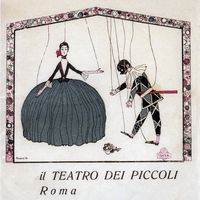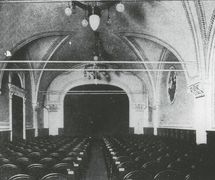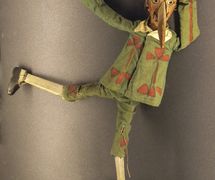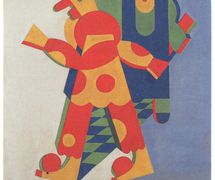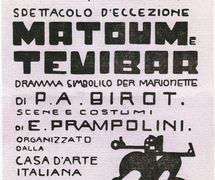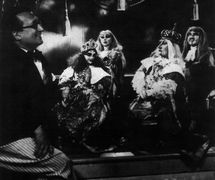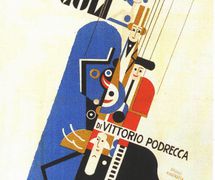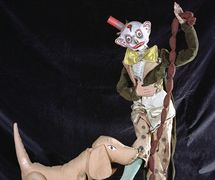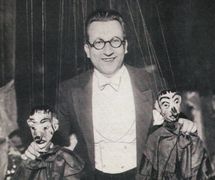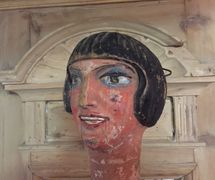Italian puppet theatre founded in 1914 in Rome by Vittorio Podrecca, who was its principal director for nearly half a century.
Vittorio Podrecca (Cividale del Friuli, Northern Italy, 1883 – Geneva, Switzerland, 1959), an eclectic and innovative personality, grew up in a family of musicians and playwrights, and the knowledge he acquired from his family resurfaced in his concepts about puppetry. The fundamental characteristic of his many productions was a sort of musicality expressed by the choreography of his figures, “moved by strings that recalled musical chords”.
The repertoire of the Piccoli troupe was vast, and ranged from the works of Monteverdi, Mozart, Gluck and Purcell to those of contemporary musicians. The company’s debut performances took place in the Verdi room of the Palazzo Odescalchi in Rome, next to the famous Teatro degli Indipendenti of Anton Giulio Bragaglia and Luigi Pirandello. These performances included the Marcia per marionette (Funeral March of a Marionette) by Charles François Gounod, La serva padrona (The Servant Turned Mistress) by Giovanni Battista Pergolesi, and La fata Morgana (Morgan le Fay) by Yorick, before distinguished audiences that included, among others, Eleonora Duse, Pietro Mascagni, Arrigo Boito, Claude Debussy, Igor Stravinsky, Arturo Toscanini …
The company benefitted from the contributions of the highly skilled puppeteer Gorno Dall’Acqua. For about ten years in its Roman locations it continued to stage productions that were always musically oriented, stimulating the creativity of a number of set designers and composers.
In 1922, Luigi Ferrari Trecate composed the musical fable Ciottolino based on a text by Gioacchino Forzano. The same year, Ottorino Respighi composed La bella addormentata nel bosco (Sleeping Beauty), based on the text by Charles Perrault. Alfredo Casella offered his musical direction for the 1917-1918 production of the Balli plastici (Plastic Ballets) by Fortunato Depero. Bruno Angoletta, Mario Pompei, and Duilio Cambellotti designed the scenery for a number of shows, contributing to the Teatro dei Piccoli what the writer Giovanni Papini defined as “the little theatre for grown-ups . . , the only one where a man gifted with imagination can surrender himself without fear of losing the magic”.
Numerous highly successful tours abroad occupied the company (twenty-five people and more than 2,000 puppets) over a period of fifteen years beginning in 1921, spanning 20,000 performances in thirty-six countries. Stranded by the outbreak of World War II while in the United States, the Teatro dei Piccoli relocated to Latin America thanks to the support of Arturo Toscanini; they produced their shows there successfully but the international situation forced them to confront serious moments of crisis. When the company returned to Italy in 1951, it made a necessary revision of their programmes with the establishment of two separate companies. One company was devoted to popular shows with an emphasis on visual appeal. The other company focused on more refined productions, which culminated in the staging of the Retablo de Maese Pedro (Master Peter’s Puppet Show, 1956), with a musical score by Manuel de Falla, at the Piccola Scala in Milan, and the staging of Geneviève de Brabant (1958), a posthumous work by Erik Satie, performed at the 21st International Festival of Contemporary Music at the Venice Biennale.
After the death of Vittorio Podrecca in Geneva in 1959, the activity of the Piccoli company continued until 1963, then experienced a fifteen-year hiatus. Finally, in 1979, the Friuli-Venezia Giulia region undertook to re-establish the company. The Piccoli reprised their productions on July 5, 1979 in Cividale del Friuli, Podrecca’s natal village, then took up again their activities and presence in theatres in Italy and abroad. One of the most remarkable productions since this return is entitled Il mondo della Luna (The World of the Moon), based on a text by Carlo Goldoni and a musical score by Franz Joseph Haydn.
Bibliography
- Cecchi, Doretta. Attori di legno [Wooden Actors]. Rome, 1988.
- McCormick, John, with Alfonso Cipolla and Alessandro Napoli. The Italian Puppet Theater – A History. Jefferson (NC): McFarland & Co., 2010.
- Vergani, Guido and Leonardo, and Maria Signorelli. Podrecca e il Teatro dei Piccoli. Cronache di una famiglia, storia del teatro dei Piccoli [Podrecca and the Teatro dei Piccoli. Chronicles of a Family, History of the Theatre of the Small]. Udine (Italia): Casamassima Editore, 1979.









